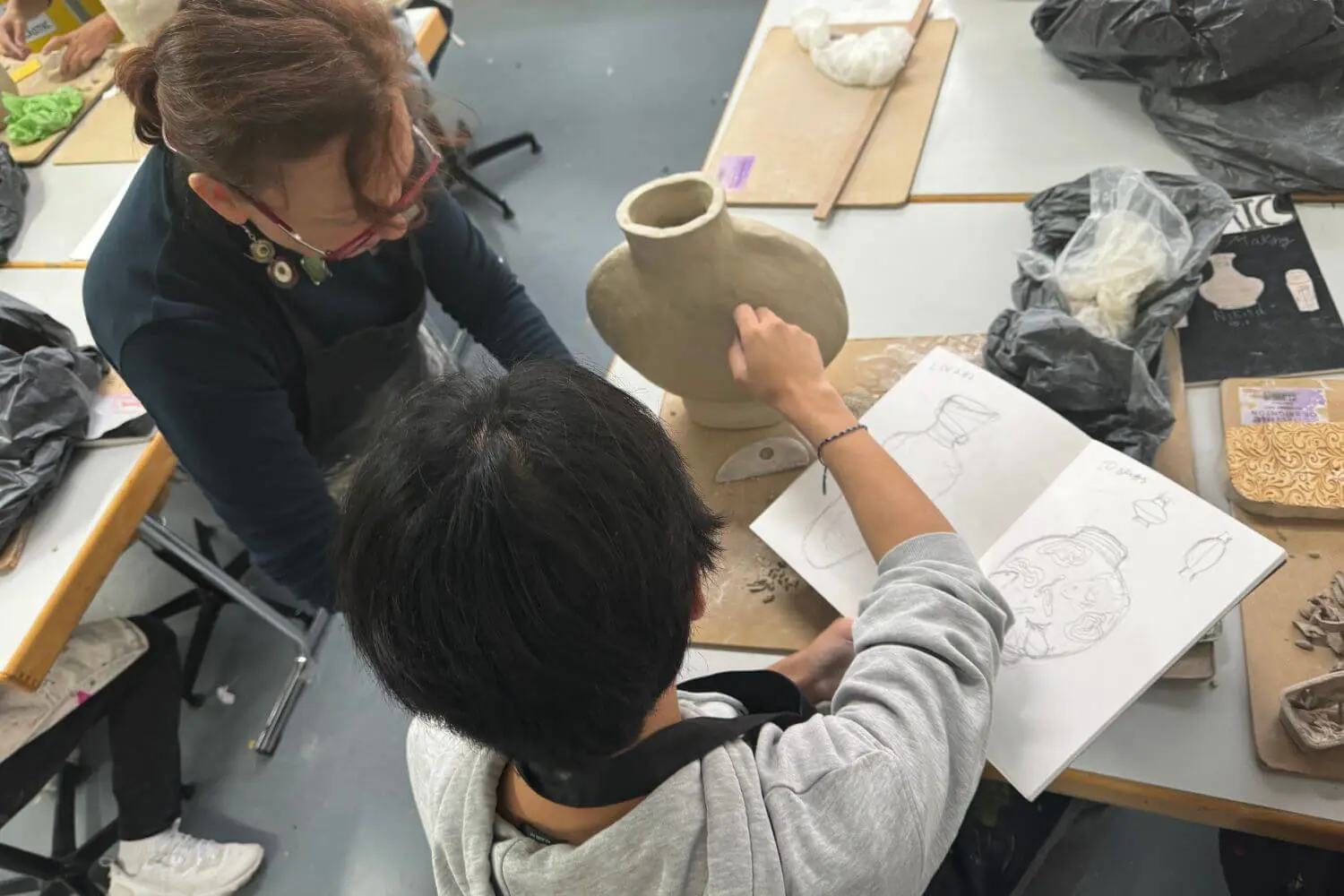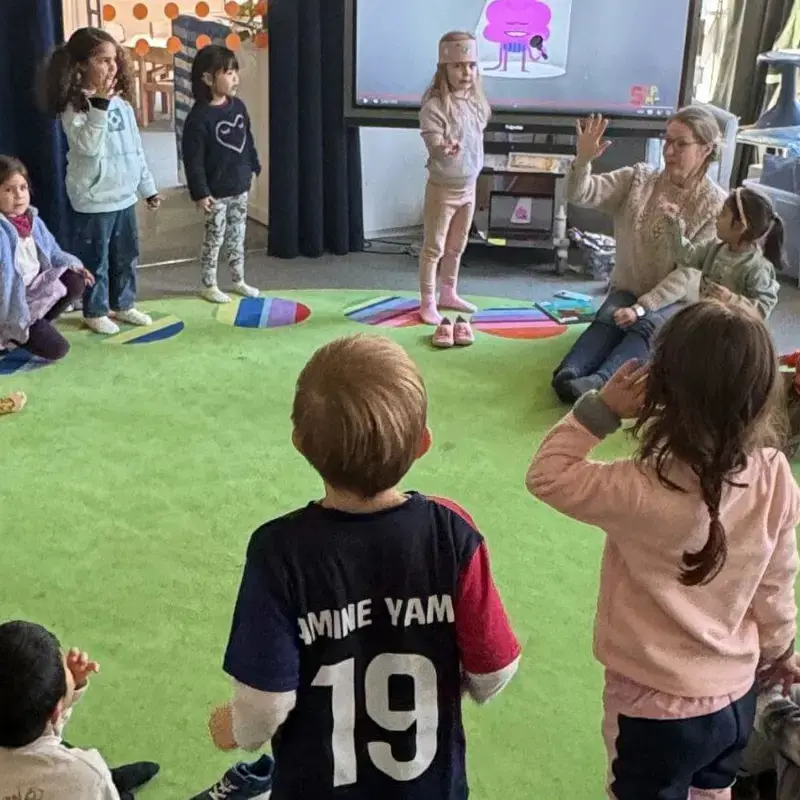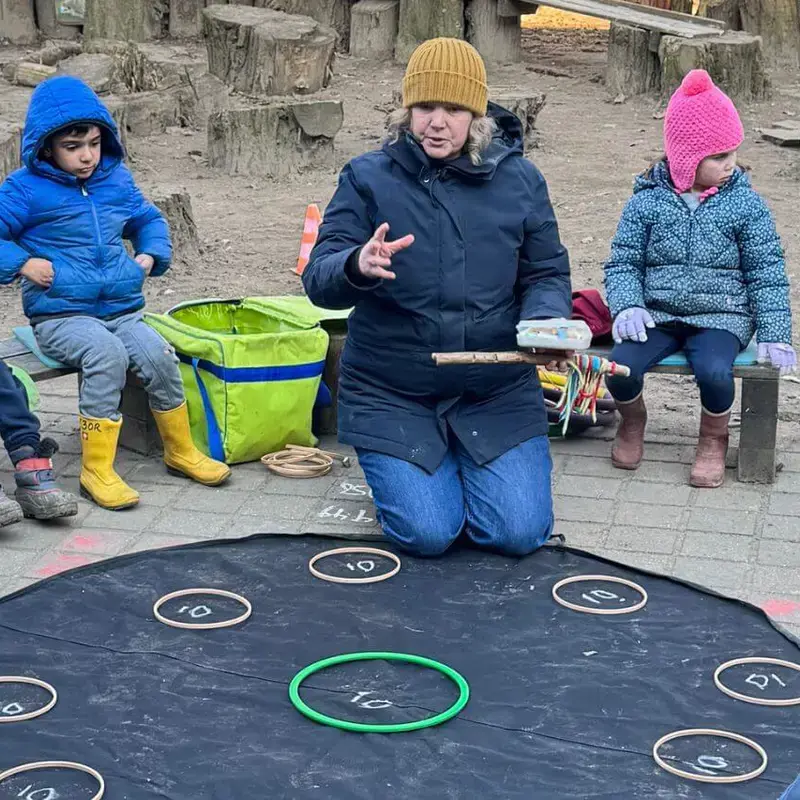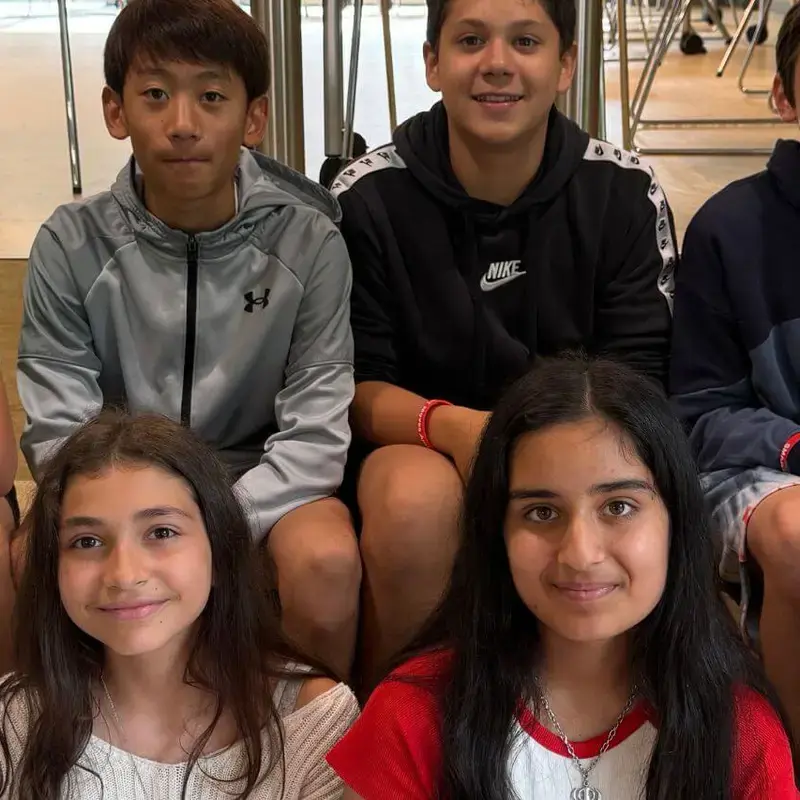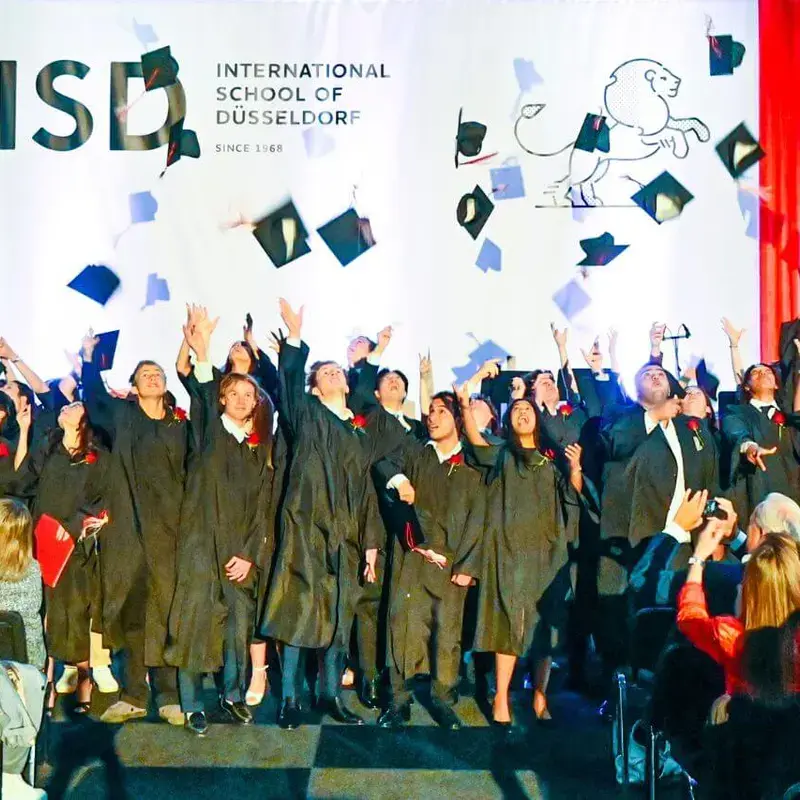Student learning is best done when it is authentic and relevant to the ‘real’ world.
At ISD, transdisciplinary learning is not confined within the boundaries of traditional subject areas but is supported and enriched by them.
Our robust curriculum includes both academic and non-academic activities that impact on student learning. We also believe all students should be supported to participate in our curriculum to their fullest extent.
LEARNING IN THE ELEMENTARY SCHOOL
We define our Elementary School curriculum as three interrelated components. In keeping with the PYP commitment to inquiry, we express these as open-ended questions, each one asking us to think deeply about our own practice with regard to student learning:
- What do we want to learn?
- How best will we learn?
- How will we know what we have learned?
|
Arts & Music |
|---|
|
Arts and music provide students with a wide range of opportunities and means to respond to their experiences and engage with historical, social and cultural contexts. We stimulate our students to think and to articulate their thoughts in new ways by employing a variety of media and technologies. |
|
German |
|
In PYP schools all students have the opportunity to learn more than one language. At ISD, each student connects with the host country in a variety of ways, including learning German approximately one period per day from the age of 5. Every learner benefits from having access to different languages, and, through that access, to different cultures and perspectives. Acquisition of more than one language enriches personal development and helps facilitate international-mindedness. There are three levels of German classes in the elementary school:EmergingMain focus on listening, speaking and vocabulary development.
DevelopingContinued focus on listening, speaking and vocabulary development, with the addition of reading and writing in mixed proficiency groupings.
ProficientSimilar to the structure of English-language core classroom learning, a balance of speaking & listening, reading & writing, viewing & presenting for native German children and non-native speakers who have attained proficiency.
|
|
Language |
|
The need to communicate is instinctive and the development of language is fundamental to the need to communicate, as it supports and enhances our thinking and understanding. Language permeates the world in which we live: it is socially constructed and dependent on the number and nature of our social interactions and relationships. Language provides a vehicle for learners to engage with the world. At ISD, we recognise that literacy becomes increasingly important as greater demands are placed on learners. Literacy encompasses oral and visual literacy, as well as the ability to read and write, to aid our students as participants in the learning process. Language also provides a vehicle for inquiry. The love and enjoyment of language is developed through the integration of literature into student inquiry. The result is that, here at ISD, teachers and students enjoy using language, appreciating it both functionally and aesthetically. |
|
Mathematics |
|
The power of mathematics for describing and analysing the world around us is such that it has become a highly effective tool for solving problems. It is also recognized that students can appreciate the intrinsic fascination of mathematics and explore the world through its unique perceptions. In the same way that students describe themselves as “authors” or “artists”, at ISD we strive to provide students with the opportunity to see themselves as “mathematicians”, supporting their enjoyment and enthusiasm when exploring and learning about mathematics. |
|
Outdoor learning |
|
Our outdoor learning team designs learning activities which drive and complement classroom units of inquiry, as well as developing stand-alone outdoor units of inquiry. Examples of units that incorporate an outdoor learning component include:
|
|
Personal, Social, & Physical Education |
|
PSPE is concerned with the promotion and development of concepts, knowledge, attitudes and skills that contribute to an individual’s well-being. Well-being encompasses physical, emotional, cognitive, spiritual and social health and development. It contributes to an understanding of self, to developing and maintaining relationships with others, and to participation in an active, healthy lifestyle. We guide students to reflect on themselves, their experiences, and the process of learning in order to support personal growth and instil an ongoing commitment to personal, social and physical well-being. |
|
Science |
|
Science leads learners to an appreciation and awareness of the world as it is viewed from a scientific perspective. It encourages curiosity and ingenuity and enables the student to develop an understanding of the world. Reflection on scientific knowledge also helps students to develop a sense of responsibility. At ISD, we encourage students to consider the impact of their actions on themselves, others and the world. |
|
Social Studies |
|
Social studies learning guides students towards a deeper understanding of themselves and others, and of their place in an increasingly global society. At ISD, we aim to provide opportunities for students to look at and think about human behaviour and activity realistically, objectively, and with sensitivity. Exposure to and experience with social studies therefore opens doors to key questions about life and learning. |
LEARNING IN THE SENIOR SCHOOL
|
English |
|---|
|
Senior School students at ISD study both English literature and language. Like any other creative endeavour, literature helps us to make sense of the world and our place in it. As readers, we are opened up to the limitless world of possibilities and opportunities, through stories, poems, novels, and plays. As for the English language, it is the world's 'lingua franca', the universal language of science, mathematics, technology, finance, and many more. English is a uniquely flexible and versatile language, in which our students are able to communicate their thoughts and ideas to a worldwide audience. In short, the study of English literature and language is vital to our students' well being: it informs, entertains, and provides a pathway to future success. |
|
German |
German Language and Literature / Language AWe support students to develop their literacy and communication skills in their mother tongue and use the framework provided in the IB MYP and DP Language and Literature guide. Our programme is also set with reference to the German Kernlehrpläne in North Rhine Westphalia. Students engage with works of literature as well as factual texts from different historical periods and a variety of media and cultures. They practice their analytical and creative writing skills as well as their critical thinking skills to become responsible citizens in a democratic society. German Language Acquisition / Language BWe support students in their German language acquisition process so that they are able to use the language adequately in different contexts and also to participate socially. We focus on the guidelines of the IB MYP and DP Language Acquisition programme and also the Common European Framework of References for Languages (CEFR). The students will use course books as well as a variety of multimedia and authentic materials. They will gain a better understanding of German culture and history and develop their intercultural awareness. We also strive to create independent learners and a variety of memorization and note taking skills are introduced to promote effective study skills. |
|
Individuals & Societies |
|
Our Individuals and Societies programme aims to instil in our students a respect for and understanding of the world around them. We also provide a skills base from which they can continue further inquiry. This is achieved through the study of individuals, societies and environments in a wide context that includes the integration of historical, geographical, political, social, economic, religious, technological, cultural and contemporary perspectives. |
|
Mathematics |
|
We maintain that mathematics is more about process than results. Thus, students are expected to communicate effectively, both orally and in writing. Our mathematics programme strives to establish an atmosphere of self-discovery within the classroom, recognizing that students need to be active participants within the learning process. Students are taught with a variety of methods, including the use of technology and manipulatives. Our mathematics classrooms provide a safe and respectful environment that is tolerant of mistakes and considerate of the learner’s language level. |
|
Music |
|
All students from grades 6-12 have the chance to engage in a performance-based music curriculum that has holistic educational benefits for all learners. In our Middle Years Programme (MYP), students in grade 6 have the choice between a string or brass instrument. In grade 7, students continue learning musicianship on their instrument of choice (strings, brass, reeds). In grade 8, students develop their performance skills from grade 6 and 7 into a combined unit with theatre. Students then experience composition and music industry production in grade 9. In grade 10, the MYP music course develops into a year-long, four unit course for students who are interested in composition, performance, production and historical analysis of music and culture. The diploma (DP) music programme is a two-year programme for students in grades 11 and 12 that revolves around the following musical components: performance, composition, analysis and investigation. |
|
Physical Health Education |
|
The physical health education programme provides a foundation for every student’s physical and social development. It is designed to develop positive attitudes towards physical activities and to instil a desire for life-long involvement in sport. The programme is co-educational and structured to provide students with a wide range of activities. Those include physical movement and exercise, recreational activities, as well as sport. |
|
Sciences |
|
In keeping with our belief that the study of science is a fundamental part of the education of all young people, science is taught in all grade levels at ISD. Instruction takes place in purpose-built laboratories which are equipped to support the aims of the curriculum and provide a safe and stimulating learning environment. |
|
Technology & Design |
|
In our technology and design classes, students not only gain knowledge of materials and processes, but also develop design and presentation skills through an investigative, open-ended pedagogical approach. They investigate, design and create products, always keeping in mind who will use them. Throughout this process, our students gain an understanding of the work and role of professional designers and of the manufacturing industry as a whole. Students are taught to evaluate and analyse their own development, the use and life cycle of products, and the impacts of products, materials and manufacturing processes on society. We also expect our students to incorporate and build on the skills acquired in other subject areas. |
|
Theatre Arts |
|
Theatre Arts at ISD provides opportunities for students and the wider school community to learn and develop through collaboratively creating, playing, improvising, and performing. In addition to offering a full IB Theatre Arts curriculum within the IB Middle Years Programme (MYP) and the IB Diploma Programme (DP), we also produce four large-scale productions each school year; two middle school performances and two upper school performances. Theatre at ISD in the IB Middle Years Programme (MYP)We currently offer MYP Theatre in grades 7 to 10. Each year, students explore a specific performance style and a world theatre tradition. At ISD, we place great importance on the value of ensemble work and the development of effective performance skills. Theatre at ISD in the IB Diploma Programme (DP)Our students may choose to take either higher level (HL) or standard level (SL) in the two-year DP Theatre Arts class. The syllabus is designed to reflect the dynamic nature of theatre and theatre-making. Depending on the personal interests of the students in each class, we can select the plays, playwrights, theorists and theatre practices we study. Those include theatrical forms, movements, styles, genres and traditions. Students also may choose the plays, theatre traditions, starting points and theatre. |
|
Visual Arts |
|
Our experienced art educators work together to create a continuous programme of art education for students from reception to grade 12. The lessons incorporate the diverse backgrounds and unique talents of each student. Individual experiments, instruction in technical skills, art criticism and cooperative projects are just some of the subjects covered. It is our aim to nurture confidence and encourage curiosity through individual and collaborative art making practices. Throughout our programmes, we work to develop the creative and critical thinking behaviours which enable students to develop the necessary tools to function successfully in a world full of visual imagery. We explore concepts from different perspectives by developing technical abilities in a range of traditional two- and three-dimensional media, lens-based digital media, and appropriate software. Risk-taking and experimentation with ideas and materials are a central aspect of our units of inquiry. Throughout the artistic journey, we highly value the documentation of the creative process: our students are required to show their investigations, development of ideas, creative thinking, reflections and evaluations within a process journal. Studio SpacesThe facilities for senior school visual arts students in grades 6-12 consist of two large visual arts studios, a dedicated sculpture room, a kiln room, a printmaking area and an installation/photographic room. |
|
World Languages |
|
Learning world languages is essential in a global world. It allows students to gain access to realities beyond their native language concepts, and thus contributes to an international understanding. At ISD, we recognise and respect the varied interests, abilities, needs and diverse cultural backgrounds of our students. Whenever possible, we select our texts and teaching materials from a broad variety of world literature. In addition to the study of literature, we consider modern media technology to be an indispensable tool for the development of language skills and employ it accordingly. Our language courses aim to develop proficiency in the respective target language. Our courses also strive to offer a range of opportunities for becoming better acquainted with the culture, customs, history and geography of the countries where the language is spoken. Aside from our classroom language, which is English, we currently offer German, French, Spanish and Japanese language courses. |

